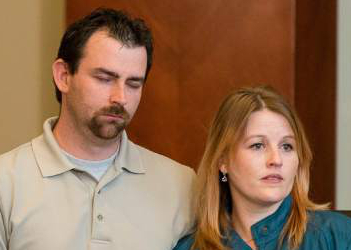This is an archived article that was published on sltrib.com in 2015, and information in the article may be outdated. It is provided only for personal research purposes and may not be reprinted.
In a judge's decision to order a now-17-year-old boy to face trial in adult court for Anne Kasprzak's 2012 murder, the girl's mother and stepfather said Wednesday that they feel their 15-year-old daughter's life was valued.
Had 3rd District Juvenile Court Judge Dane Nolan opted to keep Darwin Christopher Bagshaw's case in the juvenile system, the accused murderer would walk free in three years if convicted when the juvenile system loses jurisdiction over him.
It was unnerving, stepfather James Bratcher and mother Veronica Kasprzak-Bratcher said in a statement, to think that the person who killed Annie could be released so quickly.
"To do so implies that the 70+ years he took away from Annie that night is worth only a nominal three years," the parents said. "We are not looking for revenge or eternal punishment. The ultimate judgment of his guilt is not left to us. However, we are seeking balance and accountability. No one and no punishment will ever bring back what was lost, both from Annie as well as our family. However, this is not a loss that we feel should be swept aside."
The judge wrote in his Tuesday ruling that while an adult prison sentence would likely damage the accused teen, it was better for the community if Bagshaw were under "long-term supervision" if convicted of the alleged crimes.
Nolan further added that Bagshaw's case being moved to adult court gives flexibility: The attorneys could come to a plea bargain, a jury could acquit or convict and the Board of Pardons ultimately could set the appropriate length of time for incarceration.
Kasprzak's parents said their daughter and Bagshaw were "the same age and at the same point in life" when she was killed in 2012. The girl was 15, and Bagshaw was a few months shy of his 15th birthday.
"The actions that took place that horrible night has taken away Annie's future and the loss will affect our lives forever," the Bratchers said. "It seems to us that the only way to help restore that balance is for Chris to face a reasonable impact on his life as well. Taking life away from Chris does not bring back our Annie. However, for Chris to live his life relatively unaffected gives the message that Annie's life was not worth more."
Bagshaw now faces a penalty of 15-years-to-life in the adult prison if convicted as charged. But the judge ruled that another charge, second-degree felony obstruction of justice, is better suited to stay in juvenile court.
Bagshaw's defense attorney, Bill Russell, has said that his client would plead guilty to the charge if it stayed in juvenile court. It's likely that the teen will do that at a court hearing Thursday, when an initial appearance in adult court will also be set.
Russell did not return a phone call seeking comment Wednesday.
The Salt Lake Tribune generally does not identify juvenile defendants unless they have been certified to stand trial as an adult, as in Bagshaw's case.
The judge wrote in his 33-page ruling that in order to make his decision, he had to assume Bagshaw was guilty — though the teen has denied responsibility for the murder. Nolan wrote that it was concerning that Bagshaw could allegedly plan the murder, follow through with and then concoct lies to police at such a young age.
"This is all beyond the ability of most 14-year-olds," the judge wrote.
Kasprzak went missing from her Riverton home the night of March 10, 2012. Her beaten body was pulled from the Jordan River in Draper the next day.
Prosecutors asked that Bagshaw be tried as an adult because of the brutal nature of the crime, while Russell argued at a certification hearing last month that the case should be kept in juvenile court and that there was no evidence of premeditation or willfulness.
But prosecutors claimed the murder was planned, saying Bagshaw lured Kasprzak to an isolated spot near the Jordan River, killed her and dumped her into the river, then tried to cover up the crime. Up to nine blows caused fractures to Kasprzak's skull.
The obstruction of justice charge stems from Bagshaw's attempt to get a friend to lie to police about how Kasprzak's blood got on his shoes. The teen told police the drops of Kasprzak's blood splattered on his shoe when she had a bloody nose at the friend's house weeks before his death. The friend testified last month that he never saw the girl have a bloody nose at his home.
Bagshaw was charged over two years after Kasprzak's death. Police initially arrested two men in connection with Kasprzak's death — based on a bad tip from a female witness who was upset with the men — but they were cleared of the crime in 2013.
Twitter: @jm_miller



